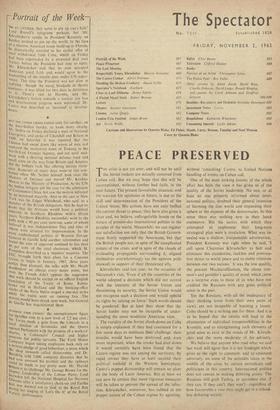Portrait of the Week — 'on AY, LETTERS, they serve to
pin up one's hair.' Lord Russell's telegrams perhaps, but Mr. Khrushchev-'s epistle to President Kennedy on Sunday seemed to pin up the world. In the face of a massive American troop build-up in Florida,
he dramatically reverted to his earlier offer of total withdrawal from Cuba, which on Friday had been superseded by a proposed deal over Turkey before the President had time to reply. Mr. Khrushchev said that he now accepted American good faith and. would agree to the dismantling of the missile sites under UN super- vision. This time the President was not slow in replying. though the naval blockade in theory continues, it was lifted for two days in deference to U Thant's visit to Havana, and Mr. Khrushchev's feelers towards a nuclear test ban and disarmament progress were welcomed. Dr. Castro was described as 'incensed at develop- ments.
81n. THE CUHAN CRISIS FADED only for another, on the Sino-Indian border, to loom more clearly.
Mr. Nehru on Friday declared a state of National Emergency, and, spoke of Churchill and Britain in
1940: on Saturday it was reported that the Chinese had swept down like waves of ants and
captured the monastery town of Towang in the North-East Frontier Agency, and not until mid- week with a thriving national defence fund and small arms on the way from Britain and America did the Indians look like offering serious resist-
ance. Rumours of many days were'at last con- firmed when Mr. Nehru himself took over the
Ministry of Defence and moved Mr. Krishna Menon to the Ministry of Production. At the UN the Indian delegate put the case for the admission of Communist China, but saw the motion defeated
by an increased majority. Also in the cast, at New York was Sir Edgar Whitehead, who said, as a
Member of the British delegation, that he had no doubt that the Africans would have a political majority in Southern Rhodesia within fifteen Years. Northern Rhodesia meanwhile went to the Polls with a 90 per cent-turn-out, some of whom believed it was Independence Day and nine of whom were arrested for impersonation. In the More sophisticated politics of Western Europe General de Gaulle held another referendum and found the vote of approval confined to less than 46 Per cent, of the total electorate, which' M. Pompidou described as a 'massive' majority. The EEC brought forth their plans for a Customs Union to begin in January, 1967, three years
earlier than planned; the talks with Mr. Heath deadlocked on almost every major point, but even the. French didn't oppose the suggestion that work should be started on an official English translation of the Treaty of Rome. Rabies
broke out in Holland and the booking-office clerks of the Paris. hUtro staged a one-day strike While the trains went on running free. The drivers, would have struck next week, but General de Gaulle has requisitioned them.
SUMMER TIME ENDED: the unemployment figure for October rose to a new level of 2.2 per cent.; local Tories made a gain from the Liberals in a local election at Sevenoaks and the Queen oPened Parliament with the promise of a workers' charter, a Consumers' Council and higher lensions for' public servants. The Ford Motor
Company began taking employees .back only on a written pledge of good behaviour, a move which
It)Ite shop stewards called dictatorship, and Dr. eechjng told 5,000 company directors that he
head now assessed his product and the railways
Wilson be made to pay pretty soon. Mr. Harold Irson is to challenge Mr. George Brown for the eputy Leadership of the Labour Party; Lord ?..riowdon left the National Hospital for Nervous
uiseases after a satisfactory check-up and Eartha Kitt was warned not to look at the Royal Box
during her singing of 'Let's Do It' at'the Royal Variety performance.


































 Previous page
Previous page